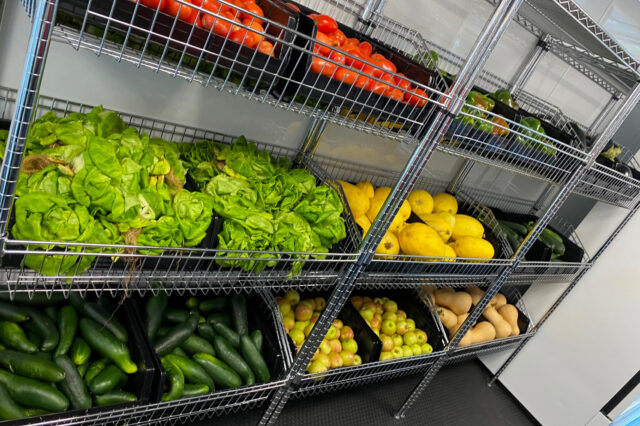UF Health awarded $500K to improve health care access in East Gainesville

A display of fresh produce is shown at the UF Health Jacksonville food pharmacy. The food pharmacy served as the inspiration for the mobile food pharmacy being developed in Gainesville. Photo provided by Cole Brown, UF Health Jacksonville.
University of Florida Health has been awarded a $500,000 grant from the Florida Blue Foundation to develop and implement programs to pull down barriers to health care for East Gainesville residents over the next five years, including a mobile food pharmacy and new transportation options.
Community needs assessments conducted by UF Health suggest that East Gainesville has the area’s highest incidence of health disparities and the most limited access to health care. The project will focus on three factors: lack of access to healthy foods, transportation obstacles and language barriers.
Lakesha Butler, Pharm.D., the associate vice president for organizational culture and strategic engagement and chief culture officer at UF Health, said focusing on these three facets can positively impact the treatment of common chronic conditions such as hypertension, cardiovascular disease, obesity and diabetes. Greater access to resources will encourage more patients to visit health care professionals to improve these and other conditions.
“This particular program requires a multifaceted approach,” said Butler, the project director. It is important to address the social drivers of health because while we can provide patients with advice, medications and direction on what is best for them; when they leave the health care professional, we may be putting them back in the same environments that strongly contributed to their health conditions without remedying it.”
The project will be tied to the UF Equal Access Clinic Network, a network of free clinics throughout Gainesville created by the UF College of Medicine. Run by UF academic health center students under faculty supervision, the clinics provide more than 2,000 patients with free annual health checkups and screenings.
To expand food access for residents, the program will develop a new mobile food pharmacy. The unit will travel to different areas of East Gainesville, where healthy food stores are scarce, to provide fresh options. Clinicians will be able to write prescriptions for healthy foods — for example, low-carb options for a patient with diabetes — and patients can pick up food free of charge through the mobile food pharmacy. Local organizations such as Bread of the Mighty will work with UF Health to supply nutritious food.
The idea for the mobile food pharmacy comes from the success of a food pharmacy established at a UF Health Jacksonville clinic in 2021, also supported by the Florida Blue Foundation.
“I firmly believe UF Health should be improving the health of the communities we serve,” said Donna Parker, M.D., a pediatrician, clinical associate professor and associate dean for health care excellence, community and belonging at the UF College of Medicine. “Nutrition is a vital component of health for whole families, and focusing on that helps to alleviate some of the stresses and burdens on patients by helping them better manage their conditions and symptoms.”
To remove the transportation barriers patients face, UF Health is also working with Uber Health, which facilitates rides to appointments as well as deliveries of prescriptions, groceries or over-the-counter products to improve patient care. A care coordinator will use the Uber Health dashboard to request a ride or delivery on behalf of the patient or caregiver.
Lastly, the program will train a cohort of health care students providing services at the clinics to become certified medical interpreters through UF Health and the Area Health Education Centers, or AHEC. This is an important factor impacting access to care, Butler said, because approximately 40% of patients seen at the clinics are non-English speaking and 20% to 30% of health care students are proficient enough in a second language to be trained as medical interpreters. Preparation for certification requires students to undertake a 16-hour course offered by the AHEC.
“It’s been proven in literature that language barriers can contribute to health disparities,” Butler said. “We can improve how effectively we are communicating with our patients by increasing the availability of certified medical interpreters. This will also ultimately increase patients’ overall access to health care.”
The program will also benefit the health professions students who participate, she said, enabling them to put into practice the clinical skills they are learning in their classes.
“It’s so important to be able to receive that hands-on learning, to gain early exposure to what it would be like to address these challenges that patients face,” Butler said. “But most importantly, when you are interacting with the patient, you see the full person, and you’re able to implement a greater level of empathy. Our students will be better prepared to work with people of varied lived experiences, and to treat them holistically.”
About the author
